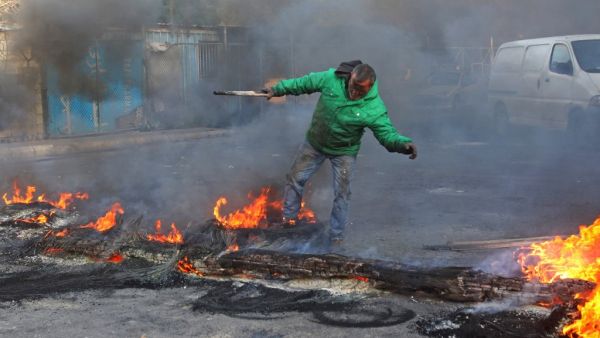Hundreds of Lebanese gathered in cities across Lebanon Wednesday, protesting for a second straight day against the crippling depreciation of the local currency and soaring unemployment.
The Lebanese pound sunk to a new record low this week, trading at LL10,000 and sparking nationwide protests which blamed the ruling political elite for rampant corruption and mismanagement. Most dealers, though, stopped selling dollars. The pound hit a record low of LL9,800 last July.
With the #Dollar selling for 10,000 lira to $1 and over half the day without electricity, people are taking to the streets to protest and express their rate at the situation. Many roads across #Lebanon are now being blocked. #لبنان #لبنان_ينتفض #لبنان_ليس_بخير #دولار pic.twitter.com/5g6AVb9jm7
— Nicholas Frakes | نيكولاس فرايكس (@nicfrakesjourno) March 2, 2021
In the southern port city of Sidon, angry protestors blocked early Wednesday a section of the highway linking Beirut to south Lebanon over deteriorating living conditions and the unchecked rise of the dollar.
Ali, a carpenter based in the southern city, said he had to shut down his business despite having a family of three.
“How can I feed my family now? I am forced to beg for money,” he told The Daily Star.
Protesters allowed trucks loaded with bread and gas tanks to cross blocked roads.
“There are poor people like us who need bread, which they will soon be unable to afford. These politicians took us back to the stone age!” Ali added.
#Lebanon roads in Bekaa, South Lebanon, Tripoli and Beirut are still blocked. Some protestors say they will spend their night in the street. Others says they will be back tomorrow. #Lebanon #لبنان_ليس_بخير #لبنان_ينتفض #لبنان @Akhbaralsaha pic.twitter.com/fGA51JpJor
— Luna Safwan - لونا صفوان (@LunaSafwan) March 2, 2021
As residents have grown tired of falling victim to a corrupt ruling class, protests erupted across the country late Tuesday and continued in some areas Wednesday morning, they echoed the same sentiment: they are hungry and can no longer afford basic necessities. Many demand the prompt enactment of sound economic policies which would yield improvements to their daily quality of life.
Another protestor, Mahmoud Abu Soltaniyeh, 54, expressed his rage at Lebanon’s political elite, especially President Michel Aoun.
“I collect iron, tin and plastic [scrap] to sell them. When we head to the doctor’s office, you put us, Mr. President, in front of three options: we die of hunger, or we steal to live or push our wives to prostitution.”
Lebanon’s political and financial elite have made addresses promising to stabilize the Lebanese pound, but their statements fell on the deaf ears of a population exhausted by empty pledges after the minimum monthly wage is now worth $68.
This article has been adapted from its original source.








